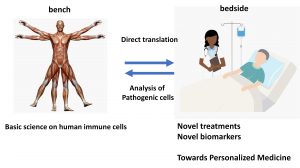Basic Immunology Research and Transnational Research with Primary Human Cells
The past few decades have witnessed the emergence of many new drugs targeting molecules expressed by immune cells. A recent great example is the development of checkpoint inhibitors for cancer treatment. We now know that the immune system plays a major role in the pathogenesis of a wider range of diseases than previously anticipated. Therefore, the research on immunology will further increase its significance in future and play fundamental roles to define disease pathogenesis in many diseases and to create new therapies.
It is not doubt that studies of the immune system in animal models have been invaluable and will remain mainstream in the field of immunology research. However, it is also very true that there are many differences in the immune system between humans and animal models. The factors and molecular pathways key to the human immune response can be painfully defined only in the experiments with human primary cells, and ultimately in clinical trials.
My lab performs research in immunology with primary human cells. Our study focuses on the adaptive immune system, the major immunological protection mechanism in charge of generation and maintenance of antigen-specific immune response.

